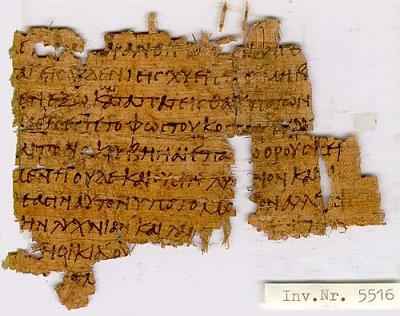| Change to Book/Chapter View |
|
|
|
Translation process is ongoing. For current status see details |
|
|

Papyrus 86 Discovered: Unknown Location: Cologne, Germany, Institut fur Altretumskunde der Universitat zu Koln Contents: Matthew 5:13-16, 22-25
Matthew 5 13 “You are the salt of the earth, but if the salt has lost its flavor, with what will it be salted? It is then good for nothing, but to be cast out and trodden under the feet of men. 14 You are the light of the world. A city located on a hill can’t be hidden. 15 Neither do you light a lamp and put it under a measuring basket, but on a stand; and it shines to all who are in the house. 16 Even so, let your light shine before men, that they may see your good works and glorify your Father who is in heaven. [..] 22 But I tell you that everyone who is angry with his brother without a cause will be in danger of the judgment. Whoever says to his brother, ‘Raca!’ will be in danger of the council. Whoever says, ‘You fool!’ will be in danger of the fire of Gehenna. 23 “If therefore you are offering your gift at the altar, and there remember that your brother has anything against you, 24 leave your gift there before the altar, and go your way. First be reconciled to your brother, and then come and offer your gift. 25 Agree with your adversary quickly while you are with him on the way; lest perhaps the prosecutor deliver you to the judge, and the judge deliver you to the officer, and you be cast into prison. |
How to read these pages: • The
translation to the left is based on the World English Bible. Words in regular
black font are words in the manuscript matching the Majority Text for that
passage. • Words
in italics cannot be seen in the manuscript, since the manuscript is
fragmentary. These words are supplied for readability by the World English
Bible translation. • Words
present in the manuscript but with some letters unreadable or missing are in blue
like this: blue. One Greek word often is
translated into multiple English words, and when this occurs, all the English
words are in blue. • Words
present in the manuscript but with spelling or trivial word order differences that do not affect the
meaning are in green like this: green. • If
the manuscript is different from the Majority Text, words in the Majority
Text that are missing from the text of the manuscript are marked through in red
like this: • If the manuscript is different from the Majority Text, words in the manuscript that are not in the Majority Text are underlined in red like this: new words.If the manuscript differs from the Majority Text yet matches another well-known text, this is noted in the footnotes.
|
